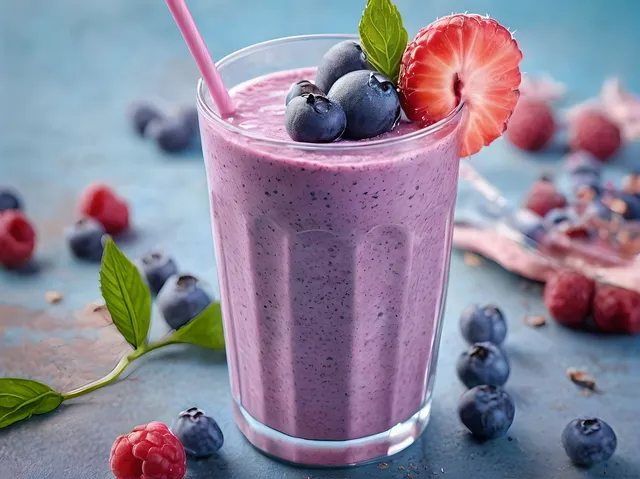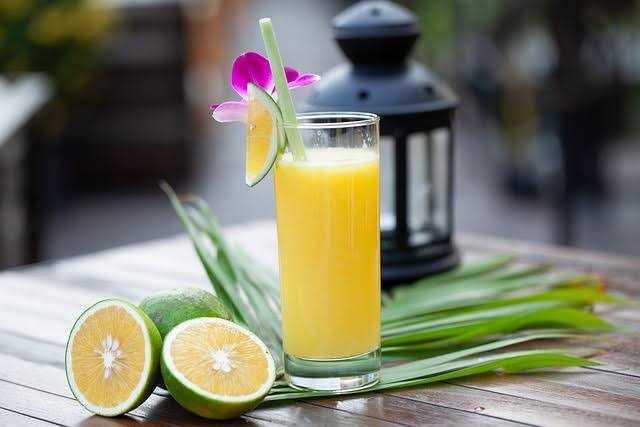Don't Eat The Garnish That's In The Juice Glass

Wonder people often find pieces of lemon or lime in a drink glass? Usually used as a decoration to make it look fresher, right?
Some people like to eat this fruit, or mix it into drinks. It turns out that this fruit is not healthy to eat.
Fruit that has been cut and left open in the room will be contaminated with bacteria more quickly. In addition, it is feared that there will be bacteria from the hands, knives or cutting boards, which are used to cut the fruit. So if you see orange decoration on the glass, well, that's its function is to beautify the appearance of the drink, not to be eaten.
.jpeg)
If we find a drink with fruit decoration on top, don't eat it, because the fruit is not fresh and not good for our bodies. Now I want to share tips on how to easily peel orange peel so that it doesn't scatter on the table and make it dirty. Especially if you've removed the seeds, the table can be very messy.
Because usually most people when peeling orange peel tend to scatter the peel, the seeds, so you need a lot of tissue. But don't worry, I have tips.
Okay, let me give you the tips.
First, make an incision in the middle of the orange with a knife. Then use the handle of a spoon. Use the handle to separate the orange from the skin.
Insert the handle, then turn it until the entire orange is free from the skin. Now let's try the other side again. Stick the skin back on so that the peeled orange doesn't get dirty on our hands, then peel the other side.
Well, done. Very easy, right?
Later the skin can be used to put the seeds.
How about it, the tips are really good.
Good luck trying it at home, hopefully successful.
Greetings always compact.
By @midiagam
Latinus
Numquam in caupona bibere iussi. Solet id, quod saepissime fit, si sucum aut potionem, quae in ornatis, praecipimus, fructus plerumque ponimus. Fiat kiwi, orange, pepo quoque, vel citreus. Non hoc bonum evenit phthisicis.
Admirari homines saepe invenire fragmenta CITREA aut calcis in potionibus bibendi? Solet ut ornamentum ad eam respicere recentior, vox?
Hunc fructum aliqui volunt comedere, vel in potiones miscere. Hoc fructum non evenit sanus ad edendum.
Fructus qui incisus et apertus intus relictus erit celerius bacteria contaminatus erit. Praeter haec, cura est quod e manibus bacteria, cultellus vel tabula incisa, usus fructus incisus est. Si igitur ornamentum aureum in vitro videris, eius munus est solum speciem potionis ornare, non edendi.
Si enim invenimus bibere fructum in eo ornatum, non manducare illum, quia non est fructus recens nec corpori nostro bonus. Nunc apicibus communicare cupimus quam facile cortices aurantiacos cortices ut in mensa non effundant ac sordidos faciant. Praeterea semina si tollas, magnum cibum facere potest in mensa.
Quia plerique, cum cortices aurantiaco cortices, sicut spargere cutem et semina, opus est multis textus. Sed ne cures, apices habeo.
OK, dabo tibi labris continuo.
Primo, in medio aurei ferro incide.
Tum utere cochleari manubrio. Utere manubrio ad separandum a cute aurantiaco.
Manubrium inserere, deinde gyrari, donec omnes partes aurantiorum a cute separantur.
Nunc alteram partem conemur. Iterum crustulum cortices ut in manibus nostris depilatus orange non sordida, deinde alteram partem cortices.
Bene, factum. Facilisis ipsum, iure?
Postea cutis semina uti potes.
Quomodo, apices illi vere boni sunt, nonne?
Conature domi, fortuna.
Semper simul salvete.
Per @midiagam